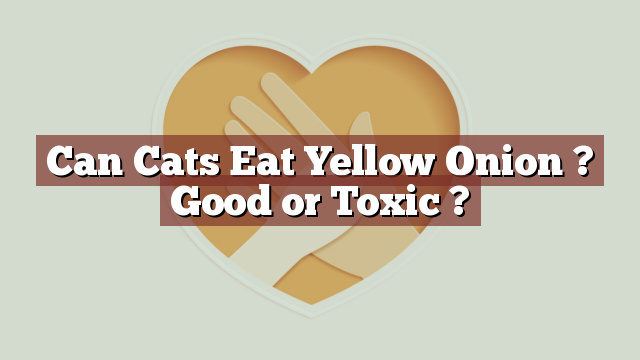Can Cats Eat Yellow Onion? Good or Toxic?
It is crucial for pet owners to be aware of the foods that are safe for their furry friends. Cats have unique dietary requirements, and certain human foods can be harmful to them. One such food is yellow onion. In this article, we will explore whether cats can eat yellow onion, discuss its nutritional value, potential risks, and steps to take if your cat accidentally consumes it.
Nutritional Value of Yellow Onion: Vitamins, Minerals, and More
Yellow onions are a popular ingredient in various cuisines due to their distinct flavor and health benefits for humans. However, when it comes to cats, it is important to understand that their nutritional needs differ from ours. Yellow onions are rich in vitamins C and B6, manganese, potassium, and dietary fiber. While these nutrients are essential for humans, cats obtain their required nutrients from meat-based diets.
Can Cats Eat Yellow Onion? Understanding the Safety Aspect
No, cats should not consume yellow onion. Onions, including yellow onions, contain a substance called N-propyl disulfide, which is toxic to cats. This compound can damage a cat’s red blood cells, leading to a condition called Heinz body anemia. Even a small amount of onion can be harmful to cats, and the toxicity can be cumulative over time. It is important to keep yellow onions and any onion-based products away from cats to ensure their well-being.
Veterinary experts and scientific studies have confirmed the adverse effects of onion ingestion in cats. The digestive system of cats is not designed to process onions, and their bodies lack the necessary enzymes to break down the substances present in onions. Therefore, it is best to avoid feeding yellow onion to your feline companion.
Potential Risks and Benefits of Feeding Yellow Onion to Cats
Feeding yellow onion to cats can have severe consequences. The toxic compounds in onions can cause oxidative damage to a cat’s red blood cells, leading to anemia. The symptoms of onion toxicity may include weakness, lethargy, pale gums, vomiting, diarrhea, and in severe cases, collapse or even death. It is essential to monitor your cat closely and seek immediate veterinary assistance if you suspect onion ingestion.
There are no significant health benefits associated with cats consuming yellow onion. Cats have different nutritional requirements than humans, and their bodies are not equipped to process certain foods. It is always best to stick to a balanced diet specifically formulated for cats to ensure their optimal health and well-being.
My Cat Ate Yellow Onion: Steps to Take for Immediate Assistance
If your cat accidentally consumes yellow onion or any onion-based product, it is crucial to act promptly. Contact your veterinarian immediately for guidance and inform them about the situation. They will provide specific instructions based on your cat’s symptoms and the amount of onion ingested. It is important to remember that home remedies or waiting for symptoms to worsen are not recommended. Seek professional veterinary assistance to ensure the best possible outcome for your feline friend.
Conclusion: Yellow Onion is Toxic for Cats, Avoid Feeding It
In conclusion, yellow onion is not safe for cats to consume. The toxic compounds present in onions can lead to severe health issues, including anemia, in cats. It is crucial for cat owners to be aware of the foods that are harmful to their pets and take necessary precautions to prevent accidental ingestion. If your cat accidentally consumes yellow onion, contact your veterinarian immediately for guidance. Remember, the well-being of our feline companions should always be our top priority.
Thank you for investing your time in exploring [page_title] on Can-Eat.org. Our goal is to provide readers like you with thorough and reliable information about various dietary topics. Each article, including [page_title], stems from diligent research and a passion for understanding the nuances of our food choices. We believe that knowledge is a vital step towards making informed and healthy decisions. However, while "[page_title]" sheds light on its specific topic, it's crucial to remember that everyone's body reacts differently to foods and dietary changes. What might be beneficial for one person could have different effects on another. Before you consider integrating suggestions or insights from "[page_title]" into your diet, it's always wise to consult with a nutritionist or healthcare professional. Their specialized knowledge ensures that you're making choices best suited to your individual health needs. As you navigate [page_title], be mindful of potential allergies, intolerances, or unique dietary requirements you may have. No singular article can capture the vast diversity of human health, and individualized guidance is invaluable. The content provided in [page_title] serves as a general guide. It is not, by any means, a substitute for personalized medical or nutritional advice. Your health should always be the top priority, and professional guidance is the best path forward. In your journey towards a balanced and nutritious lifestyle, we hope that [page_title] serves as a helpful stepping stone. Remember, informed decisions lead to healthier outcomes. Thank you for trusting Can-Eat.org. Continue exploring, learning, and prioritizing your health. Cheers to a well-informed and healthier future!

